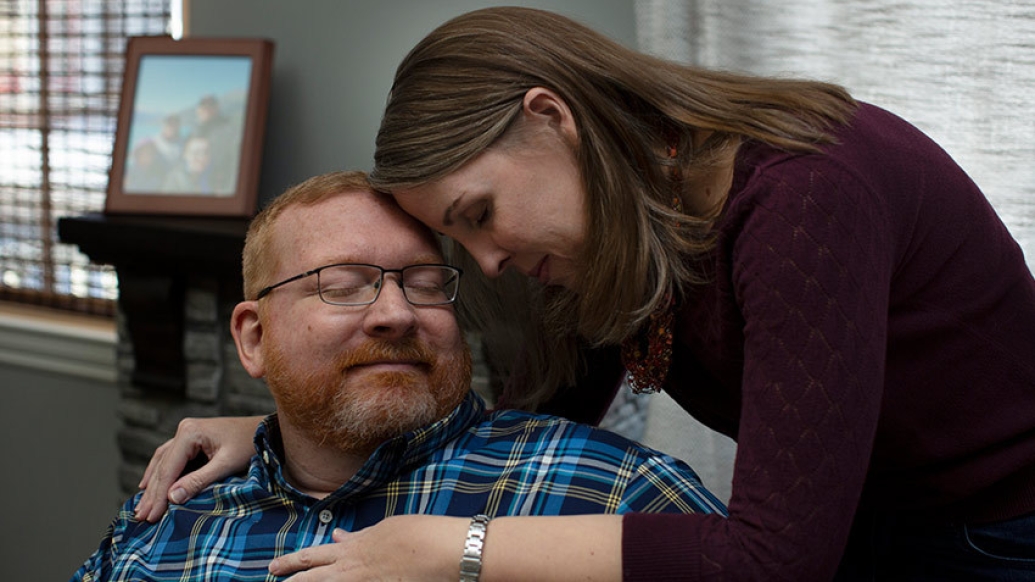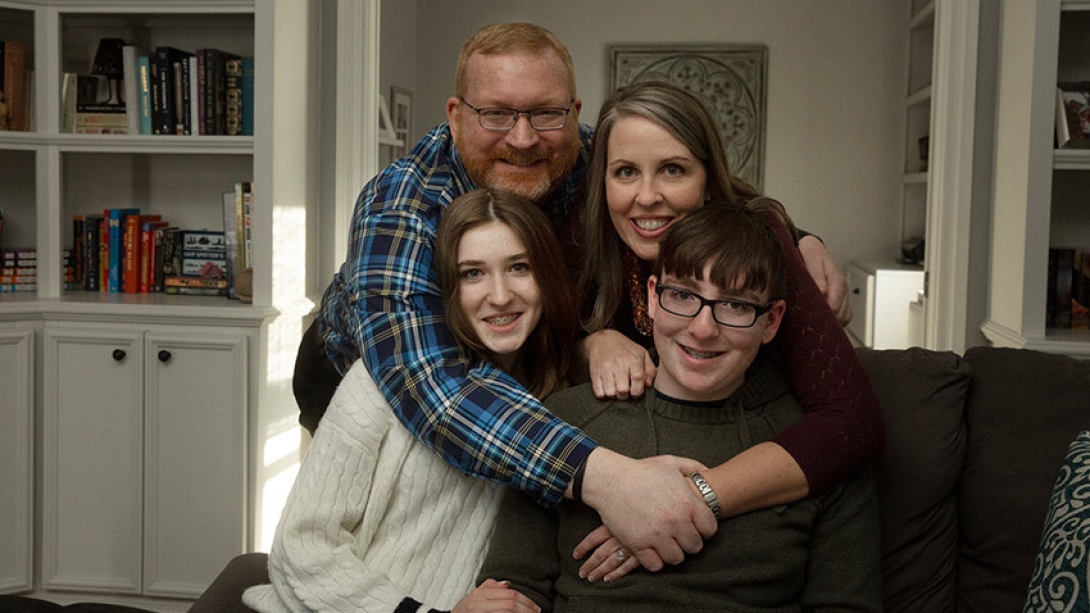Steve Keating knows he has limited time left. He’s using those days or weeks or months to pass on what he’s learned about the cancer experience to other patients.
5:00 AM
Author |

Steve Keating knows how it feels.
He knows what it's like for your hands to tingle from oxaliplatin. He knows the sensation of sweat pooling in every pore, the watering of the eyes, the running of the nose while irinotecan is infusing into your veins. He knows that providers tend to counteract those side effects with atropine, which makes the skin become dry and flaky, like you just walked through a windblown desert.
He knows how compassionate the nurses at the Rogel Cancer Center can be. He knows how hard the physicians will try to save your life.
Most of all, he knows how it feels to face your own mortality and to keep pushing, to keep giving, with the time you have left.
SEE ALSO: The New Age to Get Your Colorectal Cancer Screening
Steve is 46. He has undergone multiple surgeries and several different kinds of chemotherapy to treat his colorectal cancer. Despite the "wonderful nursing staff and doctors and overall fantastic human beings" at Rogel, Steve will likely die of his cancer or a related complication. He might be alive for a few more days or a few more years. It's difficult to know.
But Steve knows he wants to use that time, however long it is, to give back. He has recently joined the cancer center's Patient and Family Advisory Committee as well as its diversity, inclusion and justice group and hopes to become a peer mentor to, as he says, "offer straight talk from someone who's been through it."
"I want to inspire and help patients, particularly new ones," Steve says. "I don't know how much time I'm going to have, so I would really like to get moving and try to help some folks."
'I'm still here'
He found out because of a kidney stone.
That's why Steve went to the emergency room in March 2019. When his imaging showed a faint shadow on his colon as well, he scheduled what turned out to be a very short colonoscopy — as it was evident that Steve had a large, aggressive tumor. CT scans shortly afterward showed that the cancer had spread to his liver, too, despite his lack of symptoms.
Colorectal cancer has surged in younger adults over the past few decades: diagnoses under age 50 have more than doubled since the 1990s. Many of these people will live for quite some time after their treatment; in fact, one recent study found that the majority of those with early-onset colorectal cancer tend to live for at least a decade after diagnosis.
But that's only if their cancer is at an early stage when it's discovered. When the cancer has spread beyond its origin, like in Steve's case, patients often grapple with shortened lifespans.
My message to the Keatings was, 'Our goal is to put you into remission but, in your case, we probably won't put you into remission, so you'll be on lifelong treatment.'John Christopher Krauss, M.D.
At the beginning, though, there was hope. Seventeen days after his diagnosis, Steve had surgery to remove the tumors, followed by several months of chemotherapy for good measure. In December 2019, he was declared cancer-free, although he would need scans every three months to confirm the cancer hadn't returned.
"It was like, 'We've got this,'" recalls Lisa Keating, Steve's wife. "'We're going to do exactly what they say, and you're so young, so this will be fine.'"
But by March 2020, the cancer had spawned in Steve's liver again.
Since then, it's been a cycle of hospital visits, chemotherapy sessions and operations, including one to implant a hepatic artery infusion pump, which sends chemotherapy directly to the liver instead of infusing it through the veins.
Headlines from the frontlines: The power of scientific discovery harnessed and delivered to your inbox every week. Subscribe to the Michigan Health Lab blog newsletter
John Krauss, M.D., the medical director of Rogel's Multidisciplinary Colorectal Cancer Clinic and Steve's oncologist, was honest with Steve and Lisa from the start.
"In terms of prognosis, I think you can't hit people over the head with it," Krauss says. "My message to the Keatings was, 'Our goal is to put you into remission but, in your case, we probably won't put you into remission, so you'll be on lifelong treatment.'"
The couple appreciated the transparency.
"I don't have enough good words to say about Dr. Krauss," Lisa says. "He really seems to care about the patients, but he doesn't sugarcoat it either. If there wasn't a solution, he told us that. There wasn't false hope given."
As Steve started meeting with his accountant and financial planner to make sure his family could access his life insurance and pension in the future, he felt comforted.
"It's difficult," Steve says. "There's lots of tears and downtime and decent dark spaces. But it's also been a boon for the most part because we weren't ready – who's ready for that to happen? And now it's all ready to go."
At the same time, it was important to Steve to keep living as normally as he could, while he could. He, Lisa and their teenage son and daughter continue to take vacations whenever possible, with Krauss weighing in on what's safe given the pandemic and the status of Steve's health.

And Steve is still working as a material flow engineering supervisor for Ford Motor Company, often texting and emailing on his work phone from the infusion area.
"It can be done, for sure," Steve says. "I'm still here."
Surrounded by like minds
It began to occur to Steve that the nuances of his experience might be useful to share with other patients, particularly new ones. Once, when he overheard another man next to him at the cancer center "hemming and hawing" about the same chemotherapy regimen Steve was taking, Steve pulled the thick tan curtain separating them aside.
"'If you have any questions, let me know,'" Lisa recalls Steve telling the patient. "'I've been through this before.'"
The man, she says, was thrilled.
"That gave Steve a real sense that he could use his experience in a good way," Lisa says.
Steve inquired about how to volunteer and eventually became part of several cancer center patient groups, including the Patient and Family Advisory Committee, which focuses on improving the patient experience.
SEE ALSO: Beating Stage 4 Colon Cancer with Trust, Treatment and Community
When he called into his first PFAC meeting, there were about seven other people on the Zoom call. Five or six had also been through cancer.
He described the sensation as akin to the first time he got off a plane in Ireland and realized that a good half of the people there had red hair like him. He no longer felt like the only redhead — or person with cancer — in the crowd.
"I knew the committee members truly understood," he says. "Fortunately for them, they're not facing early mortality like I am, but they understand the treatment and the trauma of being a patient. These are things you can't know unless you know.
"That's what I think I can help others with," he continues. "People have enough going on with their cancer diagnosis. Knowing that someone's been through it might give them an extra lift."
Live your healthiest life: Get tips from top experts weekly. Subscribe to the Michigan Health blog newsletter
Like Podcasts? Add the Michigan Medicine News Break on Spotify, Apple Podcasts or anywhere you listen to podcasts.

Explore a variety of healthcare news & stories by visiting the Health Lab home page for more articles.

Department of Communication at Michigan Medicine
Want top health & research news weekly? Sign up for Health Lab’s newsletters today!





